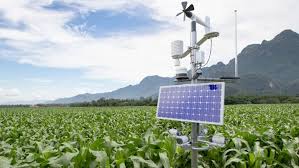In the arid landscapes of Bahrain, where traditional agriculture faces numerous challenges, the integration of smart farming technologies is revolutionizing food production. These innovations not only enhance agricultural efficiency but also play a pivotal role in ensuring the nation’s food security.
Transforming Agriculture with Smart Technologies
Bahrain’s commitment to food security has led to the adoption of advanced agricultural technologies. The implementation of smart farming practices, including precision agriculture, IoT-based systems, and automated machinery, has significantly improved crop yields and resource management. These technologies enable farmers to monitor soil health, weather conditions, and crop growth in real-time, allowing for timely interventions and optimized production.
Precision Irrigation: Maximizing Water Efficiency
Water scarcity is a critical concern in Bahrain’s agriculture. To address this, precision irrigation systems powered by IoT sensors have been introduced. These systems monitor soil moisture levels and weather forecasts to deliver the exact amount of water needed to crops, reducing waste and conserving this precious resource. By ensuring that water is used efficiently, these technologies contribute to sustainable farming practices and enhance food security.

Drones and Satellite Imaging: Enhancing Crop Monitoring
The use of drones and satellite imaging has revolutionized crop monitoring in Bahrain. These tools provide farmers with aerial views of their fields, enabling them to assess crop health, detect pest infestations, and identify areas requiring attention. This aerial perspective allows for more accurate and timely decisions, leading to healthier crops and improved yields.
Vertical and Hydroponic Farming: Overcoming Land Limitations
Given Bahrain’s limited arable land, vertical and hydroponic farming methods have gained popularity. These soilless farming techniques utilize controlled environments and nutrient-rich water solutions to grow crops vertically, maximizing space and reducing the need for large plots of land. Such innovations enable the production of a variety of crops in urban settings, contributing to local food supply and reducing dependency on imports.

AI and Machine Learning: Predicting and Preventing Crop Diseases
Artificial Intelligence (AI) and machine learning algorithms are being employed to predict and prevent crop diseases. By analyzing data from various sources, these technologies can identify patterns and predict potential outbreaks of pests or diseases. This proactive approach allows farmers to take preventive measures, reducing crop loss and ensuring a stable food supply.
Policy Support and Strategic Initiatives
The Bahraini government has recognized the importance of smart farming technologies in achieving food security. Strategic initiatives and policies have been implemented to support the adoption of these technologies. This includes providing training programs for farmers, offering financial incentives for technology adoption, and fostering partnerships between the public and private sectors. Such supportive measures create an enabling environment for the growth of smart agriculture in Bahrain.
Community Engagement and Capacity Building
Empowering local communities is essential for the success of smart farming initiatives. In Bahrain, efforts are being made to engage farmers and local communities in the adoption of smart farming practices. Training workshops, awareness campaigns, and collaborative projects are being organized to build capacity and ensure that the benefits of these technologies are widely accessible. Community involvement fosters a sense of ownership and encourages the sustainable use of smart farming technologies.
Future Prospects: A Sustainable and Secure Food System
Looking ahead, the continued integration of smart farming technologies in Bahrain holds promise for a sustainable and secure food system. Ongoing research and development efforts aim to refine existing technologies and introduce new innovations that address emerging challenges. By embracing technological advancements and fostering a collaborative approach, Bahrain can enhance its food security and serve as a model for other nations facing similar agricultural challenges.
In conclusion, smart farming technologies are playing a transformative role in Bahrain’s agricultural sector. Through precision irrigation, advanced monitoring tools, innovative farming methods, and supportive policies, Bahrain is paving the way towards a more resilient and self-sufficient food system. The continued investment in and adoption of these technologies will be crucial in securing the nation’s food future.
Do follow Gulf Magazine on Instagram.
Also Read – Bahrain’s Bold Leap Into a 5G-Powered Future



